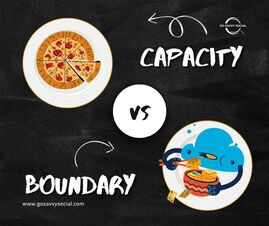Navigating Capacity and Boundaries: The Key to Sustainable Performance in Professional Roles3/11/2024 The ability to perform at peak levels is often seen as the hallmark of success and competence. However, sustaining high performance over time necessitates a deep understanding of one's capacity and the establishment of clear boundaries. Let's explore the balance between maximizing performance and acknowledging our limitations, offering insights on how professionals can maintain effectiveness while ensuring long-term well-being.
Understanding Capacity: More Than Just Time Management Capacity in a professional context extends beyond the mere allocation of hours in a day. It encompasses the physical, mental, and emotional resources available to an individual. Recognizing one's capacity involves self-awareness about energy levels, cognitive load, and emotional resilience. High performance is not just about doing more in less time but about optimizing the use of one's resources to achieve the best outcomes. Setting Boundaries: The Foundation of Sustainable Performance Boundaries in the workplace are essential for protecting one's capacity. They help in delineating what one is willing to take on and define the limits of engagement with work tasks and responsibilities. Effective boundaries can prevent burnout, reduce stress, and maintain a healthy work-life balance, all of which are crucial for long-term performance sustainability.
The Role of Communication Effective communication is pivotal in maintaining boundaries and managing capacity. Articulating one's limits and negotiating workloads with colleagues and superiors fosters a supportive work environment. It helps in setting realistic expectations and fosters a culture of respect and understanding. The Power of Delegation: Delegation is a key strategy in managing capacity By entrusting tasks to others, professionals can focus on areas where they add the most value, thereby enhancing overall team performance and individual job satisfaction. Recognizing the Signals: Being attuned to the signs of exceeding capacity is crucial. Symptoms such as chronic fatigue, decreased productivity, and disengagement signal the need to reassess workload and boundaries. Regular self-check-ins and feedback from peers can aid in this recognition. Embracing Balance for Peak Performance The journey towards sustaining peak performance in professional roles is a dynamic process that requires continuous adjustment and self-reflection. By understanding one's capacity, setting and respecting boundaries, and embracing the principles of communication and delegation, professionals can not only achieve high levels of performance but also ensure their well-being and job satisfaction in the long run. Let's prioritize not just the outcomes we achieve but also the sustainable practices that get us there. Together, we can redefine success in the professional realm, making it synonymous with balance, well-being, and resilience.
0 Comments
Leave a Reply. |
AuthorAshly Hughes Archives
June 2024
Categories |
|
© COPYRIGHT 2009. ALL RIGHTS RESERVED.
|


 RSS Feed
RSS Feed
